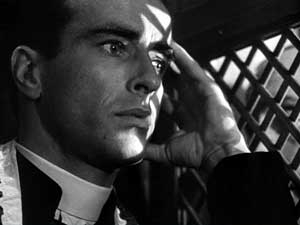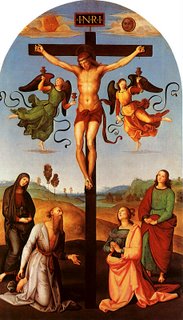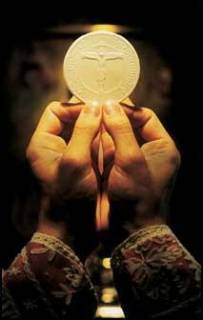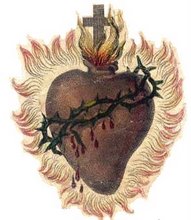Venite Adoremus
O holy night, the stars are brightly shining;
Led by the light of faith serenely beaming,
Truly He taught us to love one another;
Thoughts from a cleric of the Church of Rome
Posted by
WNV
at
10:40 AM
4
comments
![]()
Father George W. Rutler, pastor of The Church of the Savior in Manhattan, writes a truly delightful column in Crisis Magazine. The column (Cloud of Witnesses) found below was taken from the Catholic Education Resource Center and is posted below. Father writes about people he has known over the course of his life who have gone home to God in such a way that the reader really gets a feel for them, really gets a glimpse into everyday holiness.
Such "everyday holiness" is the stuff of saints. Pray for Jesus Vasquez, pray for Father Rutler, and pray for me as well, that we may all become part of that cloud of witnesses known as the communion of saints.
God love you!
************
Posted by
WNV
at
1:22 PM
4
comments
![]()
Hong Kong's Cardinal Zen is an extraordinary man. Since his ordination in 1961, he has been an extraordinary voice for religious liberty, human rights, and democracy in China. He has never been afraid to speak up, and has been a prophetic voice in China for more than 40 years. This article from the Telegraph is the latest example of this.
Ubi Petrus, ibi Ecclesia. Where Peter is, there the Church is. To take the age old maxim to the next level, where the Church is, there is Christ. Without Peter, what remains is either a fossil or a sham.
Pray for Cardinal Zen. Pray for the Church in China. Pray.
Questions and comments are welcome.
God love you!
************
Posted by
WNV
at
9:08 PM
1 comments
![]()
This great article is taken from Monsters and Critics.
The Cardinal Newman Society has, over the years, been a strong voice in calling for accountability in Catholic Colleges. This is just one more example of their fine work.
In regard to Catholic Colleges, my question is: Where has the integrity gone? I don't understand how "learned people" can hide under the mantle of the Church in order to attack, defame and undermine her. Whether one agrees or disagrees with Church teaching, integrity demands that if one works for a Catholic institution, and professes belief in the Catholic Church, that one would uphold the teachings and norms of that same Church. To not do so is dishonest at best (and some would hold even sinful).
Pray for the Cardinal Newman Society and the fine work that they do.
God love you!
************
Posted by
WNV
at
10:12 AM
0
comments
![]()
While looking for the Carthusian motto online, I came across this great homily offered on the Feast of St. Bruno, the founder of the Carthusians. I thought I would share it here.
God love you!
************

The Seal and Motto of the Carthusian Order.
"The Cross stands while the world turns."
Homily for School Mass: Feast of St. Bruno
Friday October 7, 2006
Fr. Bede Price, O.S.B.
Earlier this week, the church celebrated the feast of a man who can arguably be called the most popular Christian Saint — St. Francis of Assisi. St. Francis took the Lord at his word when he said “sell all you have and come follow me” and then preached to the world the power of evangelical poverty. There is no place in the world where his master is preached that hasn’t also heard of the poor man of Assisi.
Today the church commemorates one of her far less well known heroes — St. Bruno. St. Bruno lived at almost the same time as St. Francis, though he is hardly a household name. The words of Christ Bruno heard were “Come away by yourselves and rest a while”, and his great gift to us was the witness of solitude in the pursuit of Holiness.
The religious order founded by St. Francis is among the largest, perhaps the largest in the church, who have worked zealously in schools, parishes, hospitals and universities. The monastic family founded by St. Bruno is the smallest religious order, whose lives are lived in almost total isolation and practically complete silence within their monasteries.
What these great Saints have to tell us is that there is no single way to Christian Holiness, but that the pursuit of it is not optional. Both saints lived for Christ alone, though they sought him in radically different ways. We too must seek to find and serve Christ in the way that pleases him. This is of particular importance for Christians your age. As you move from being children to men, you are obviously much concerned with the future. You have your mind fixed on College, on careers, perhaps even on families. Some of you probably aspire to wealth or even fame. All of us I am sure hope that whatever happens to us, we will be happy.
The decisions you make now and those you will make in the next few years will largely determine the course of much of the rest of your life. Be sure that you make these decisions deliberately. Be sure you try to be guided by Christ, because he has a vocation for each of you, and the extent to which you hear his call and respond to it will determine your happiness.
And when speaking of happiness, please don’t misunderstand me. I’m not talking about the sort of short-term happiness that you might feel after a successful test or a well-fought football game. I’m speaking of that deep down sense of being right with God and right with the world that produces in us a sense of peace. This form of happiness is perhaps more rightly called Christian Joy and it makes us able to bear the sufferings and trials that come our way as the result of our own sins and the sins of others. No Christian vocation is real unless it is lived in the shadow of the Cross. St. Francis was given the great grace of bearing in his own body the wounds Christ suffered for him and St. Bruno — like all saints who seek Christ in the desert of solitude had to wrestle with demons, which is why he is the patron of exorcists. He gave his monks a motto “Crux stat dum volvitur orbis” (the Cross stands while the world turns about it” The cross is the true axis of the world even if the world doesn’t know! Or as TS Eliot would have us put it: Christ is “at the still point of the turning world”.
One of the greatest of the 20th century martyrs was that true son of St. Francis — St. Maximillian Kolbe, who offered himself in place of one of his fellow prisoners at Auschwitz and was condemned to a horrible death in a starvation bunker in the worst days of World War II. St. Maximillian, was able to go to his death with peace and serenity, singing hymns because even in that place of evil and darkness Christ brought good out of evil. St. John Houghton was a Carthusian Monk in England during that other reign of terror called the English Reformation. When St. John was ripped from the seclusion of his cloister and then literally ripped apart at Tyburn, he was described by St. Thomas More as going to his death like a bridegroom going to church on his wedding day.
Posted by
WNV
at
10:13 PM
1 comments
![]()
I found this link , entitled "Word on the Street," via American Papist. It's hilarious!
Stop by and check it out!
Posted by
WNV
at
1:34 PM
2
comments
![]()
Posted by
WNV
at
3:26 PM
2
comments
![]()
This blog is a response to a reader who wanted to know more about mortal and venial sin. I found a great answer on EWTN's website, which I highly recomend to people looking for Catholic answers.
(Could I have answered it myself without EWTN? Absolutely. But why re-invent the wheel?)
Questions and comments are welcome.
God love you!
************
Posted by
WNV
at
3:07 PM
2
comments
![]()
Labels: Apologetics, Mortal, Sin, Venial
This great article was published by Catholic News Service.
The Pope said at the heart of the article: "Making reference to the immanent arrival of Christmas, the Pope indicated that "in the grotto of Bethlehem we adore the same Lord who wanted to make himself our spiritual nourishment in the Eucharistic sacrament, in order to transform the world from within beginning from the human heart.""
This is what it is all about. The transformation of all creation into what it was meant to be. This begins with the transformation of hearts and souls, so that what the Father sees and loves in Christ He may see and love in us. The Eucharist is the pluperfect gift of God to man, for it is nothing less than the gift of Himself. The transformed human soul, made perfect by the Eucharist, is the gift that man gives back to God.
Questions and comments are welcome.
God love you!
************

Posted by
WNV
at
2:53 PM
0
comments
![]()
This great piece is taken from John Allen's column in the National Catholic Reporter. I have a great many issues with the Reporter, but John Allen is not one of them. We don't always see eye to eye, but he strikes me as a fair, faithful man who is a good columnist. This column is on the relationship between Salvatore Cardinal Pappalardo, the former archbishop of Palermo, and Father Giuseppe “Pino” Puglisi, the pastor of a rough Palermo neighborhood.
Their relationship was wasn't always good, but there was an appreciation of the role that the other had to play in the life of the Church. Everyone is not called to do the same thing in the same way, but all are called to be faithful and holy in their day to day circumstances. Father Puglisi did so to such an extent that he is being considered for canonization. Cardinal Pappalardo passed away on the 10th of December of this year. It's an interesting article and a good read.
(A nod as well to Dom over at BettNet for the heads up on this article.)
Feel free to comment or leave questions. God love you!
************
Posted by
WNV
at
12:42 PM
0
comments
![]()
I found this article from the Independant. Could our culinary over-consumption be the true enemy of environmental consciousness? (Perhaps we should mandate meatless Fridays again...)
Is this how the cow strikes against mankind for centuries of hamburgers, hot dogs, meatloaf, prime rib, and filet mignon? Is this their revenge? Is this something we should truly be worried about, or is it perhaps just another environmental over-reaction?
The clarion call for virtue and moderation go out once again. These two qualities, virtue and moderation, as classically understood, would solve most of the worlds problems.

Could our bovine friends be public enemy #1?

"Great news! We've bred a cow that doesn't release any methane!"
Posted by
WNV
at
4:19 PM
2
comments
![]()
Posted by
WNV
at
7:30 PM
4
comments
![]()
Labels: Apocalypto, Mel Gibson, movies
The feast of St. Nicholas was on Wednesday of this week (December 6th). I found this great article about St. Nicholas on LifeSiteNews, a great website with alot of great stories. It is great to see a story about St. Nicholas the Bishop, and read a little about why "St. Nick" is synonamous with "Santa Claus". If it is truly better to give than to receive, the gift of purity is one that we can give both to God, and to a future spouse. As with all true gifts, the gift we give is also a gift we recieve, and purity is no exception.
Merry Christmas, and God love you!
************

Posted by
WNV
at
1:44 PM
7
comments
![]()
Labels: Purity, Saint Nicholas
A wonderful Sister forwarded to me this article taken from Catholic World News, a great source for Catholic news and a Catholic perspective on secular news. This article details the excommunication of a number of dissident groups, first among them Call to Action, by Bishop Fabian Bruskewitz of Lincoln, Nebraska. Call to Action appealed this ruling to the Vatican, and the Vatican upheld Bishop Bruskewitz's ruling.
Why do I think this is a good thing? Well, to draw on an analogy based on human body, healing can't begin until disease is recognized. These excommunicated groups have placed themselves, by their own actions, outside of the fold of the Church. No matter what the reason may be, be it ignorance or malice, it is an act of love on the part of the Bishop and of the Church to tell these groups the truth of their situation. Why? It's not punitive but pastoral. Now that they have been told that they have placed themselves outside of the fold, healing can take place, for reconciliation can be sought. Let us pray for the members of these groups. Let us also pray for Bishop Bruskewitz, a shepherd after the heart of Christ, that he may remain strong in the battle.
On another note, the picture on the bottom of this post is entitled, "The Excommunication of Robert the Pious." Robert was the king of France, and was excommunicated for (according to Wikipedia) "marital problems." Whatever the issue was, he remedied it and was reconciled. Robert is an example to all of the below mentioned groups, not for his problems, but for his ready solution.
Questions and comments are indeed welcome. This blog is new, so if you enjoy reading, tell a friend. God love you!
************
Posted by
WNV
at
12:51 PM
10
comments
![]()
Posted by
WNV
at
12:58 PM
3
comments
![]()
Posted by
WNV
at
9:55 AM
13
comments
![]()
When I began to post blogs, my "Blog Create" page had a toolbar at the top of the blog entry area so that I could add pictures, center and bold text, use spell checker, etc. It has vanished for some reason! I imagine it is because I have done something wrong. If anyone knows how to fix this, I would be greatly appreciative!
Posted by
WNV
at
12:40 PM
7
comments
![]()
Labels: Help
I took this well written post from Whispers in the Loggia . Prime Minister Blair demonstrates that the tactics used by states and adopted by the UN are not helping the AIDs pandemic, but are indeed making it worse. Thanks to Whispers for this great story.
************
The British prime minister made his World AIDS Day statement on MTV:
In a pointed criticism of the Vatican's stance on contraception, Mr Blair used a television interview on World Aids Day to insist that preaching abstinence was not enough.... Mr Blair said: "The danger is if we have a sort of blanket ban from religious hierarchy saying it's wrong to do it, then you discourage people from doing it in circumstances where they need to protect their lives."...
"When I was growing up it was more to do with telling youngsters about the actual act of sex. I think what it is about now is telling them about the dangers of having unprotected sex," he said.
Mr Blair insisted that people should be encouraged to protect themselves against HIV, and that it was "silly" to say otherwise.
Meanwhile, the primate of England and Wales offered a counterpoint on the Sunday chat-shows:
Cardinal [Cormac] Murphy-O'Connor told the BBC's Sunday AM: "I have to say the prime minister is saying 'I am going to give more and more aid, including more condoms into Africa'.
"I think what I would like to say to the prime minister is that it would be much better if he used that money to provide more antiretroviral drugs - medicines - for the millions of children, women who are affected.
"I speak to bishops in Africa and they tell me that their dioceses are flooded with condoms and I said 'Well, has it affected?' They said 'Well, sad to say it has meant more promiscuity and more Aids'.
"You have got to look at this, I think, within the whole context of the African culture."
He went on to say the best way to combat the disease is by having monogamous relationships.
He said: "The way to combat Aids is primarily, as everybody should know, behaviourally - keeping monogamous relationships between a man and a woman."
Posted by
WNV
at
12:39 PM
0
comments
![]()
Thanks to American Papist (link at right) for this great slideshow of Pope Benedict's trip to Turkey. It is worthy of a few minutes browsing! (I would have added a picture, but the toolbar with the button to add pictures seems to have disappeared. Hmmm)
Papal Slideshow
Posted by
WNV
at
1:17 PM
1 comments
![]()


Posted by
WNV
at
6:17 PM
15
comments
![]()
Labels: Confession, Sacrament, Salvation

Posted by
WNV
at
2:06 PM
6
comments
![]()
Labels: Chesterton, Cigar, Moderation


Posted by
WNV
at
12:29 AM
1 comments
![]()
Labels: Aquinas, Eucharist, Sacrament, Sacred Heart, Summa
This blog was originally published on my other blog. I repost it here because I think it provides a good backgroung. I am asked constantly why I became a priest. People ask me in person, and people ask me via MySpace. I am always happy to answer, but my fingers can't take anymore typing, so I thought a blogged answer would satisfy the masses and save me some precious time, so here goes. I'll start at the beginning and work my way forward. (After typing this, I realized that it's around 1,800 words. A little long, but bear with me. I think you'll enjoy reading it.) 
Posted by
WNV
at
11:13 PM
2
comments
![]()
Labels: ordination, priesthood, vocation

